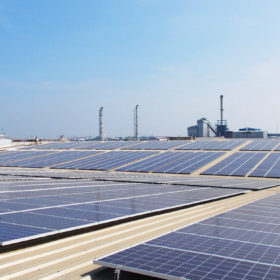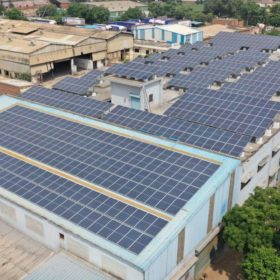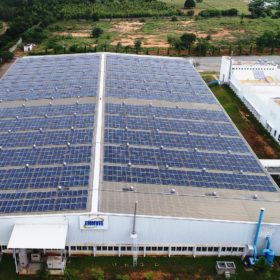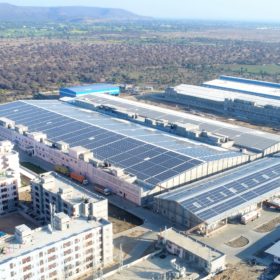The long read: Storage … ready?
The story of residential rooftop solar is one of liberation. Confronted with high module prices, early PV adopters experienced significantly longer payback periods – it was not unheard of for homeowners to be making monthly finance payments higher than their utility bills. But consumers were motivated, seeking independence from the stranglehold that electricity providers had on them with ever-increasing utility rates.
India’s solar future: Domestic first, international second
The International Solar Alliance signals India’s hope to be a global competitor in emerging technologies and cement its place as an institution builder. But how does India’s vision translate into domestic policy? Has India led by example?
Tata Power to set up India’s largest solar carport for Tata Motors
The 6.2 MWp ‘carport style’ solar plant at Tata Motors’ Chikhali plant in the Pune district will use 12,896 monocrystalline panels rated 485 Wp each and cover an area of 40,000 sq.m.
Indian Railways solarises 960 Stations, 198 MW rooftop PV for another 550 under execution
The nation’s largest electricity consumer is working towards installing 500 MW of rooftop solar generation capacity by 2021-22. Besides, it aims to establish an aggregate 20 GW ground-mount solar capacity by 2030, which shall come up over 51,000 hectares of its trackside vacant land.
Uttarakhand’s Pant University to get a 2.2 MW rooftop solar plant
Bids are invited to install a 2,285 kWp grid-connected rooftop solar system at G.B. Pant University Of Agriculture And Technology. The plant is to be set up under the RESCO model. Ceiling tariff for over 25 years is fixed at Rs 3.5/kWh.
India added just 351 MW of solar capacity in Q2, 42,229 MW in pipeline: Bridge To India
Covid-related disruption hit solar project construction in the second quarter. The activity will likely rebound over the coming quarters, with 4,720 MW expected to be commissioned in the second half.
India could add 2.5 GW of big solar in second half
Some 1 GW of utility scale project capacity was added to the end of June.
Financing in rooftop solar
There is a need to innovate and pay attention to micro, small and medium enterprises (MSMEs), SMEs, and residential society consumers to activate the next leg of growth in the rooftop solar market.
Karnataka opens tender for rooftop solar in Belagavi
Developers have until August 29 to submit bids for the installation of grid-connected rooftop solar plants on selected government buildings of Belagavi Smart City.
SunSource Energy commissions a 6 MW rooftop solar plant in Rajasthan
The project—based on Resco model—is developed for the Bhilwara industrial site of a textile company. It is spread across five rooftops covering 21,00,000 square feet and uses 20,000 solar modules of different types.













